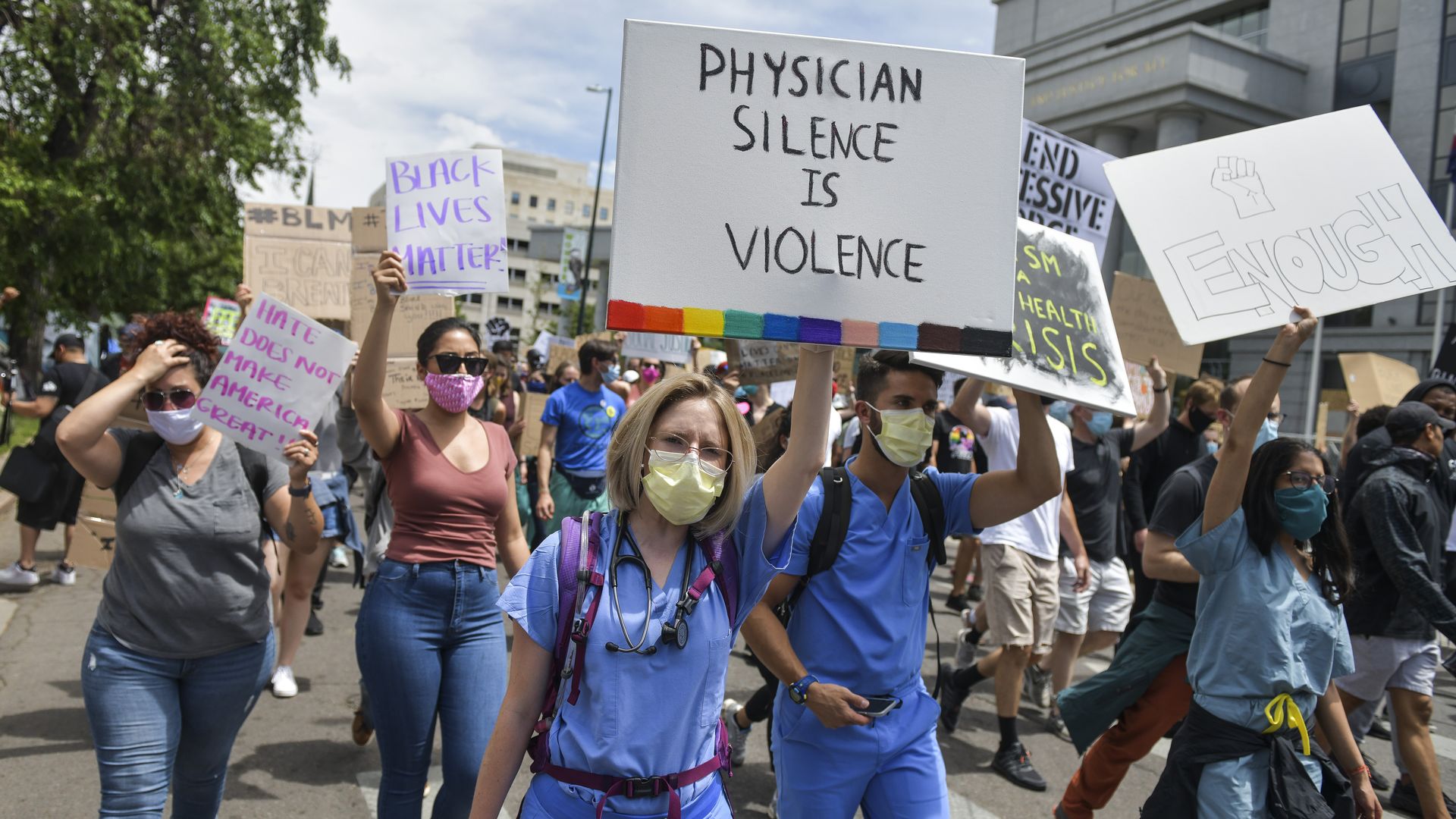Scientists caught between pandemic and protests
Add Axios as your preferred source to
see more of our stories on Google.

Physicians march with people protesting George Floyd's death in Denver, Colorado, June 6. Photo: Michael Ciaglo/Getty Images
When protests broke out against the coronavirus lockdown, many public health experts were quick to warn about spreading the virus. When protests broke out after George Floyd's death, some of the same experts embraced the protests. That's led to charges of double standards among scientists.
Why it matters: Scientists who are seen as changing recommendations based on political and social priorities, however important, risk losing public trust. That could cause people to disregard their advice should the pandemic require stricter lockdown policies.
What's happening: Many public health experts came out against public gatherings of almost any sort this spring — including protests over lockdown policies and large religious gatherings.
- But some of the same experts are supporting the Black Lives Matter protests, arguing that addressing racial inequality is key to tackling the coronavirus epidemic.
- The systemic racism that protesters are decrying contributes to massive health disparities that can be seen in this pandemic — black Americans comprise 13% of the U.S. population, but make up around a quarter of deaths from COVID-19. Floyd himself survived COVID-19 before he was killed by a now former police officer in Minneapolis.
- "While everyone is concerned about the risk of COVID, there are risks with just being black in this country that almost outweigh that sometimes," Abby Hussein, an infectious disease fellow at the University of Washington, told CNN last week.
Yes, but: Spending time in a large group, even outdoors and wearing masks — as many of the protesters are — does raise the risk of coronavirus transmission, says Michael Osterholm, director of the Center for Infectious Disease Research and Policy at the University of Minnesota.
- In a Twitter thread over the weekend, coronavirus expert Trevor Bedford estimated that each day of protests would result in some 3,000 additional infections, which over time could lead to hundreds of additional deaths each day.
- Public health experts who work in the government have struck a cautionary note. Mass, in-person protests are a "perfect setup" for transmission of the virus, Anthony Fauci told radio station WTOP last week. "It's a delicate balance because the reasons for demonstrating are valid, but the demonstration puts one at additional risk."
The difference in tone between how some public health experts are viewing the current protests and earlier ones focused on the lockdowns themselves was seized upon by a number of critics, as well as the Trump campaign.
- "It will deepen the idea that the intellectual classes are picking winners and losers among political causes," says Tom Nichols, author of the "The Death of Expertise."
- Politico reported that the Trump campaign plans to restart campaign rallies in the next two weeks, with advisers arguing that "recent massive protests in metropolitan areas will make it harder for liberals to criticize him" despite the ongoing pandemic.
The current debate underscores a larger question: What role should scientists play in policymaking?
- "We should never try to harness the credibility of public health on behalf of our judgments as citizens," writes Peter Sandman, a retired professor of environmental journalism. He tells Axios some scientists who supported one protest versus others "clearly damaged the credibility of public health as a scientific enterprise that struggles to be politically neutral."
- But some are pushing back against the very idea of scientific neutrality. "Science is part of how we got to our racist system in the first place," Susan Matthews wrote in Slate.
- Medical science has often betrayed the trust of black Americans, who receive less, and often worse, care than white Americans. That means — as Uché Blackstock, a physician and CEO of Advancing Health Equity, told NPR — that the pandemic presents "a crisis within a crisis."
The big picture: The debate risks exacerbating a partisan divide among Americans in their reported trust in scientists.
- 53% of Democrats polled in late April — about a month before Floyd's death — reported a "great deal of confidence in medical scientists to act in the public interests" versus 31% of Republicans.
- If science-driven policymaking continues to be seen as biased, it will have repercussions for public trust in issues beyond the pandemic, including climate change, AI and genetic engineering.
What to watch: If there is a rise in new cases in the coming weeks, there will be pressure to trace them — to protests, rallies and the reopening of states. How experts weigh in could affect how their recommendations will be viewed in the future — and whether the public, whatever their political leanings, will follow them again.
Editor's note: This story was corrected to say that Peter Sandman is a retired professor.

